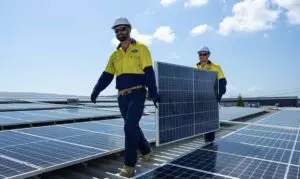 Australia has some of the highest electricity prices in the world due to an overbuild of network infrastructure. Could falling battery costs cause increasing numbers of customers to abandon the system altogether?
Australia has some of the highest electricity prices in the world due to an overbuild of network infrastructure. Could falling battery costs cause increasing numbers of customers to abandon the system altogether?
Solar power installers in the country say the cost of batteries is the only thing holding back more widespread consumer grid defection in the residential sector.
Australia is already in the midst of a rooftop solar boom as grid customers look to offset the rising cost of utility power.
Almost one-fifth of Australian households now use solar panels for electricity or hot water, tempted by three- to four-year payback times and national rebates that reduce the upfront cost of a PV system.
The rebate is one of a number of renewable energy support systems under threat from the current administration.
An elimination of the PV subsidy could add a couple of thousand dollars to the price of a typical residential solar power system, which currently costs between around AUD $5,000 (USD $3,890) and $10,000 (USD $7,790) for a 5-kilowatt setup.
For now, attempts to cut back on Australia’s renewable energy commitments have been met with spirited opposition, leading utilities to resort to other measures to keep customers on the grid.
In Queensland, for example, lawmakers last year upended energy pricing to reduce savings from solar installations or efficiency measures.
Elsewhere, utilities are reported to have streamlined grid connection formalities in the last 12 months, so off-grid homeowners find it easier to get a supply. Such measures simply appear to be delaying the inevitable, according to some in the solar business.
“Once the battery technology improves and becomes more readily available, then I think there will be a certain tipping point. I’m convinced of it,” said Paul Thompson, who runs an installation business called Green Sun Solar in Perth.
“I speak to a lot of people, and they would be extremely happy if they could give the middle finger to the power companies. I think people would love to go completely off-grid or hybrid, but it boils down to [battery] price,” he said.
Thompson said he sees a lot of interest from consumers, but once they find out the price, “they back off a bit.”
Nevertheless, he said, even the elimination of solar power subsidies likely would not be enough to halt Australia’s growing trend toward reducing grid-based consumption, and possibly grid defection.
Even as the economics of batteries and solar improve, the lifestyle adjustment needed to defect from the power system may be too great for consumers. But some analysts are warning utilities in Australia that they should expect some consumers to consider the option.
In addition, ViZn Energy Systems, the zinc redox flow battery system developer, confirms that for commercial and industrial customers, “the case can now be made that in [some] regions, having a microgrid is a better option.”
Ian Graham, an application engineer at ViZn, said he sees some of the same trends in the commercial and industrial sectors.
“Storage is the key to making microgrids feasible by increasing renewable capacity and firming intermittency. That’s why what we do at ViZn Energy is gaining traction. Storage systems we build are helping make these projects happen,” said Graham.
Working out how to deal with the situation could be difficult for Australian utilities. Analysts have suggested that customer anger could accelerate the process, particularly since Australian utilities score lowest for customer loyalty and advocacy among all of the country’s key service sectors.
A more promising approach might be taking shape to the east, in New Zealand. There, the service provider Vector is offering residential solar sale and leaseback packages to its customers, with storage available as an option.
While the outcome is still very murky in Australia, there at least appears to be growing awareness in the country’s power sector of the need to adapt to a changing customer landscape.
First published in Greentech Media. Reproduced with permission.







